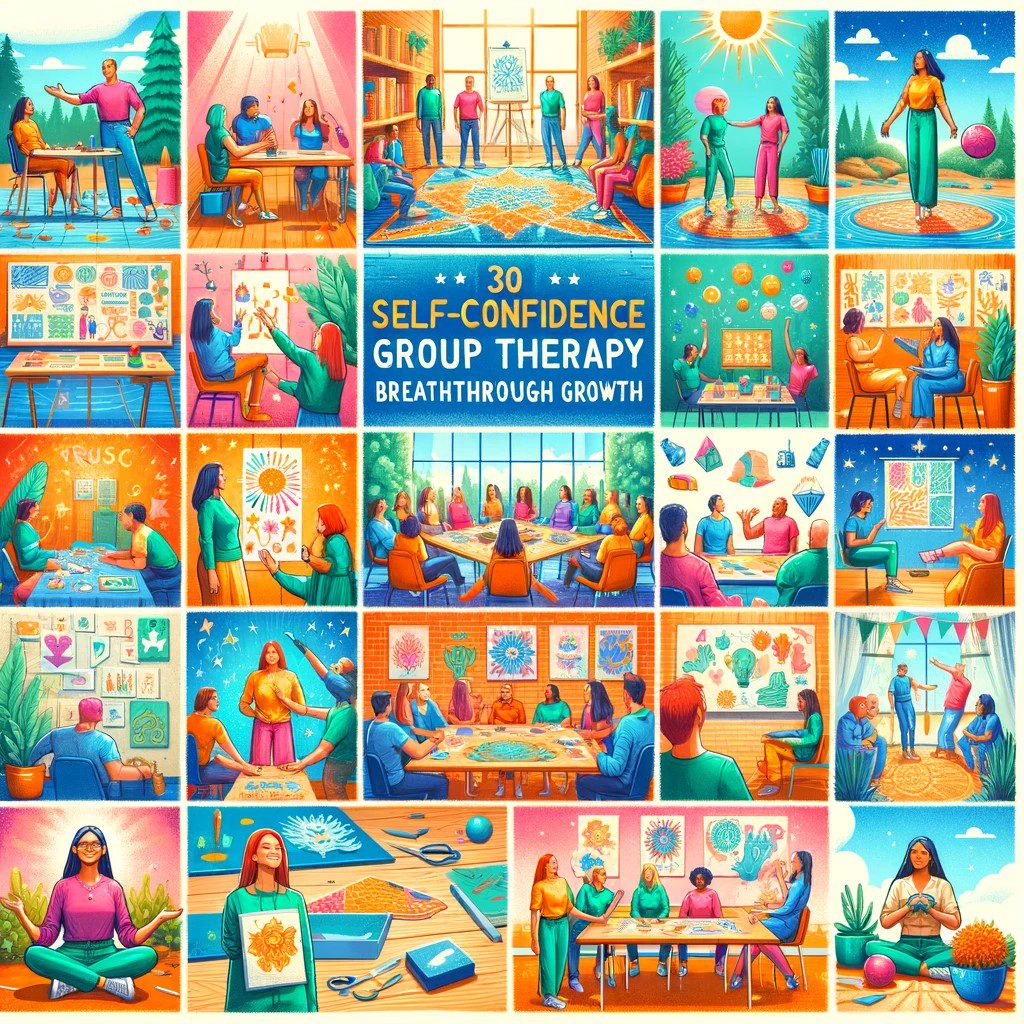Last updated on February 25th, 2025
Does it ever feel like you can’t be seen when you’re in a room full of strangers? Or are you nervous and trip over your words when you’re giving a speech?
Don’t feel bad. Low self-esteem and confidence are problems that many of us deal with in silence.
But what if we told you that the journey to get past these problems can be shared?
Self Confidence Group Therapy Activities, a safe place where the power of group support can change your growth.
Some people don’t realize how powerful unity and shared experiences can be in a world where individual success is often the main focus.
However, the magic of group synergy happens when people work on themselves and feel good about their own abilities. This exploration is an invitation to start a journey of healing and empowerment together.
Self-confidence both protects us and makes us vulnerable to doubt and fear. It pushes us to take advantage of opportunities and believe in our own abilities.
People find a safe place to talk about their problems and strengths with others in a supportive setting in group therapy. This makes them stronger, more understanding, and more capable of deep growth.
Anyone who wants to not only regain their confidence but also create it from scratch through shared experience is welcome to read this blog post.
Each of the activities we’ve chosen is meant to challenge, inspire, and elevate, whether you’re a group therapy leader looking to make your sessions more powerful or a person looking to grow and connect with others, these activities are for you.
Everyone can thrive in this environment, thanks to creative team-building activities that encourage open communication and vulnerability and individual tasks that help people find their strengths.
We can open up the potential for unbreakable self-confidence and self-esteem by going on a journey together to find out more about ourselves and gain collective power.
You can learn that the connections you make with other people are often your greatest strength through these 30 activities. They also show you how to live a more confident and united life.
Self-Confidence and Its Importance
Having confidence in yourself isn’t like flipping a switch that changes how you see yourself. Finding out about yourself, growing, and accepting yourself are all part of the journey.
Confidence means trusting yourself, which means appreciating your own skills and potential without putting them down or exaggerating them.
Most of the time, we stay on the negative end of this energy-efficient emotional scale, doubting our skills instead of being grateful for them.
I can’t say enough about how important it is to build real confidence because it has a direct effect on how you live your life.
Strong self-confidence leads to personal growth and overall well-being in a circle-like way, pushing us to leave our comfort zones and face challenges head-on with amazing strength.
Imagine going through the ups and downs of life with complete confidence in your abilities. That sounds empowering, doesn’t it?
That’s the power we have when we have real confidence. How you see yourself really does affect every part of your life, like how tiny dust particles can change galaxies far away.
Role of Group Activities in Building Self Confidence
Taking on the challenges of group activities is one of the best ways to boost our confidence and increase self-esteem.
When we do group activities over and over again, we become less nervous or unsure of our skills, which boosts our confidence.
Working with others creates a net of diversity that makes for a good place to learn and grow. This openness to others is directly linked to self-confidence.
When we do things with other people, our strengths and weaknesses become clear, which can be hard to see when we’re working alone.
The great thing about this is that groups can give each other helpful feedback and new ideas.
Have you ever noticed that some problems seem less scary when you work on them with other people?
Well, that’s the reassuring feeling that comes from working together that gets stored in your confidence.
30 Self Confidence Group Therapy Activities for Breakthrough Growth
1. Positive Affirmation Circles
In Positive Affirmation Circles, the group forms a circle, and one by one, each participant shares a positive statement about themselves.
This could be anything from “I am resilient” to “I am a kind friend.” After one person shares, the others in the circle are encouraged to add onto the affirmation with their own positive observations about that person.
This not only reinforces the individual’s self-image but also promotes a supportive group environment where everyone feels valued and uplifted.
2. Role-Playing Scenarios
Role-Playing Scenarios involve participants acting out specific situations to practice and develop assertiveness and positive communication skills.
These scenarios can range from handling a difficult conversation at work to standing up for oneself in a personal relationship.
After each role-play, the group discusses the outcomes, what was learned, and how different approaches might lead to more positive results.
This activity helps individuals prepare for real-life situations where assertiveness is key to personal and professional success.
3. Strengths Showcase
In the Strengths Showcase, each participant prepares a short presentation about their unique strengths and talents. This could be anything from artistic skills to problem-solving abilities.
Presenting these strengths to the group not only allows each individual to recognize and celebrate their own capabilities but also enlightens others to the diverse talents within the group.
This activity can be particularly empowering as it encourages individuals to focus on and develop their strengths further.
4. Gratitude Sharing
Gratitude Sharing sessions involve participants reflecting on and sharing what they are grateful for about themselves. This could relate to personal achievements, character traits, or even overcoming challenges.
Sharing these thoughts with the group helps to cultivate a positive mindset and encourages individuals to appreciate their own journey and qualities.
This practice of gratitude has been shown to significantly enhance overall well-being and self-esteem.
5. Vision Board Creation
Creating Vision Boards is a powerful and creative activity where participants use magazines, photographs, quotes, and various art supplies to create a visual representation of their personal and group goals.
This can include career aspirations, personal growth targets, or lifestyle changes. Working on vision boards in a group setting not only boosts motivation and belief in oneself but also creates a sense of accountability and support among participants.
Sharing and explaining their vision boards helps individuals clarify their goals and the steps needed to achieve them, making their dreams more tangible and achievable.
6. Compliment Tag
Compliment Tag is an engaging and uplifting game designed to promote an environment of positivity and mutual respect.
In this activity, participants are encouraged to give genuine, thoughtful compliments to each other, either in a circle or in a more dynamic ‘tag’ format where individuals ‘tag’ someone with a compliment before receiving one themselves.
This game not only enhances positive interactions within the group but also helps individuals recognize and vocalize the value they see in others, thereby boosting the overall group morale and individual self-esteem.
7. Confidence-Boosting Workshops
These workshops are interactive sessions that includes a variety of self-esteem-building exercises, from role-playing scenarios to group discussions on topics related to self-worth, body image, and personal growth.
Facilitators might introduce theoretical concepts of self-confidence, followed by practical activities that allow participants to apply these ideas in real-life contexts.
The goal is to provide tools and strategies that participants can use to improve their self-confidence, with the supportive group environment making the learning process both effective and enjoyable.
8. Public Speaking Practice
Public Speaking Practice sessions offer a safe and supportive environment where group members can develop and refine their speaking skills.
Participants prepare and deliver short speeches or presentations in front of the group, focusing on various aspects of public speaking, such as clarity, persuasion, and engaging the audience.
After each presentation, constructive feedback is provided by both peers and facilitators, emphasizing positive reinforcement and specific areas for improvement.
This activity aims to reduce the anxiety associated with public speaking while enhancing communication skills and self-confidence.
9. Goal Setting and Accountability Groups
In these groups, participants set personal goals and share them with the group to create a sense of accountability.
Regular meetings allow members to report on their progress, discuss any obstacles they’ve encountered, and receive encouragement and advice from the group.
This collective approach not only promotes a sense of achievement and motivation but also builds a supportive community where members feel responsible for each other’s success, enhancing the commitment to personal goals.
10. Trust Building Activities
Trust-building activities, such as trust falls or blindfolded guidance games, are designed to strengthen the bonds between group members through exercises that require trust and cooperation.
These activities challenge participants to rely on each other in vulnerable situations, thereby promoting a deeper sense of trust and teamwork within the group.
The success of these exercises depends on communication, mutual respect, and the willingness to support one another, making them powerful tools for building cohesive and supportive group dynamics.
11. Self-Reflection Sessions
Self-Reflection Sessions are guided activities where participants take time to contemplate and share their personal achievements, challenges, and areas for growth.
Facilitators may provide prompts or themes to guide the reflection process, encouraging participants to look inward and assess their personal journeys.
Sharing these reflections in a supportive group setting allows for a shared experience of vulnerability and growth, promoting empathy, understanding, and a deeper connection among group members.
12. Empowerment Yoga
Empowerment Yoga sessions combine the physical practice of yoga with a focus on mental and emotional well-being.
These sessions are designed to include poses and sequences that promote self-confidence, body positivity, and mental clarity.
Instructors may incorporate affirmations or mindfulness practices that align with themes of empowerment and self-love, creating a holistic experience that supports the development of a positive self-image and a strong sense of inner peace.
13. Motivational Speaker Sessions
These sessions feature speakers who share their personal journeys of overcoming adversity, highlighting the strategies they used to build resilience and self-confidence.
The aim is to inspire participants through real-life examples, demonstrating that obstacles can be stepping stones to greater achievements.
These speakers often share tips and techniques for maintaining a positive outlook, setting goals, and persisting despite challenges, leaving participants feeling motivated and empowered to tackle their own hurdles.
14. Positive Psychology Workshops
These workshops digs into the scientific study of what makes life most worth living, focusing on the strengths and virtues that enable individuals and communities to thrive.
Facilitators introduce concepts such as gratitude, optimism, flow, and resilience, offering practical exercises that participants can incorporate into their daily lives to enhance their well-being and happiness.
The goal is to shift focus from fixing weaknesses to enhancing strengths, thereby improving self-esteem and promoting a positive outlook on life.
15. Creative Expression Through Art Therapy
Participants use various art forms—such as painting, drawing, sculpture, or collage—to explore and express their self-identity and personal strengths.
This process not only allows for therapeutic self-expression but also encourages self-discovery and the celebration of individuality.
Sharing and discussing their creations in a group setting can further validate each participant’s experiences and perspectives, promoting a supportive community atmosphere.
16. Skill Swap
In Skill Swap sessions, group members have the opportunity to teach something they excel at, whether it’s a professional skill, a hobby, or a personal talent.
This reciprocal learning experience not only highlights the unique value and capabilities of each participant but also promotes a sense of community and mutual respect.
It’s an excellent way to build confidence, as teaching others is a powerful affirmation of one’s own knowledge and abilities.
17. Group Meditation for Self-Love
Guided group meditations focus on themes of self-love, acceptance, and compassion towards oneself. Practicing meditation in a group amplifies the collective energy, making the experience more powerful.
These sessions often include guided imagery, affirmations, or mindfulness exercises specifically designed to cultivate a loving and accepting relationship with oneself, enhancing self-esteem and promoting emotional healing.
18. Resilience Building Exercises
These activities are designed to challenge participants in a supportive environment, with the goal of building resilience and self-confidence.
Challenges might include problem-solving tasks, physical endurance exercises, or scenarios that require adaptive thinking.
The aim is to teach participants how to persevere through difficulties, adapt to change, and emerge stronger, thereby promoting a resilient mindset.
19. Empathy Role Play
Empathy Role Play involves participants taking on different roles to act out scenarios that require understanding and responding to the emotions and perspectives of others.
This exercise enhances empathy, a crucial component of emotional intelligence, by allowing participants to experience different viewpoints first hand.
It also improves self-awareness by reflecting on their responses to various situations, promoting a deeper understanding of oneself and others.
20. Outdoor Adventure Challenges
These challenges involve group outings to engage in physical activities like hiking, rock climbing, or completing an obstacle course.
Such activities push individuals out of their comfort zones in a safe and supportive environment, helping them to build confidence and trust in their abilities.
The shared experience of overcoming physical challenges also strengthens group cohesion and encourages a supportive network among participants.
21. Personal Growth Book Club
A book club focused on personal development and self-improvement genres, where members read and discuss books that inspire self-confidence and personal growth.
Discussions revolve around the themes, ideas, and practical applications presented in the books, allowing participants to share insights and experiences related to their personal journeys.
This activity promotes a community of learners who support each other’s goals and aspirations, encouraging continuous personal development.
22. Feedback Circles
Feedback Circles are structured sessions where group members take turns giving and receiving constructive feedback in a supportive and non-judgmental environment.
This process focuses on recognizing each person’s strengths while also gently addressing areas for improvement.
The goal is to promote an atmosphere of trust and openness, where feedback is seen as a valuable tool for personal and professional growth.
Participants learn to articulate their thoughts in a constructive manner and to receive feedback with openness and gratitude, enhancing interpersonal skills and self-awareness.
23. Confidence-Boosting Boot Camps
Confidence-Boosting Boot Camps are intensive, action-packed programs that combine physical activities, mental challenges, and motivational speaking to rapidly build self-confidence.
These boot camps may include obstacle courses, public speaking drills, teamwork exercises, and personal reflection time.
The high-energy environment pushes participants out of their comfort zones in a controlled setting, encouraging them to take risks and face fears with the support of the group and facilitators.
The aim is to promote a sense of accomplishment and empowerment that participants can carry into their daily lives.
24. Cultural Exchange Evenings
Cultural Exchange Evenings are events dedicated to sharing and celebrating the diverse cultural backgrounds of group members.
These gatherings might feature traditional food, music, dance, and storytelling from different cultures, creating an inclusive space for learning and appreciation.
By showcasing the richness of their cultural heritage, participants promote a deeper understanding and respect for each other, strengthening community bonds and enhancing self-pride in one’s cultural identity.
25. Professional Development Workshops
These workshops are tailored to equip participants with the skills and knowledge necessary for career advancement.
Covering a range of topics from effective communication and leadership to negotiation and time management, these sessions aim to build professional confidence.
Interactive exercises, role-playing, and group discussions help participants apply what they learn in real-world scenarios, enhancing their employability and career prospects.
26. Music and Dance Therapy
Music and Dance Therapy sessions use the expressive power of music and movement to improve mental well-being and self esteem.
Participants engage in activities that allow them to express their emotions freely, release stress, and connect with others on a deeper level.
These therapeutic sessions can lead to increased mood, improved self-expression, and a stronger sense of community among participants.
27. Mindfulness and Self-Compassion Sessions
In these sessions, participants learn mindfulness techniques and practices of self-compassion to cultivate a more gentle and forgiving relationship with themselves.
Guided meditations, journaling exercises, and group discussions focus on developing a mindful presence, recognizing one’s shared humanity, and practicing kindness towards oneself.
These techniques are valuable for reducing negative self-talk and negative thought, thus promoting a state of peace and well-being.
28. Hero’s Journey Storytelling
This activity invites participants to share their personal story in the framework of the Hero’s Journey, highlighting their challenges, growth, and triumphs.
By framing their life stories as heroic journeys, individuals gain a new perspective on their struggles and successes, recognizing their strength and resilience.
Sharing these stories in a group setting promotes empathy, connection, and mutual inspiration.
29. Assertiveness Training Courses
Assertiveness Training Courses offer practical exercises and strategies to help individuals communicate their needs, opinions, and boundaries more effectively, without aggression or passivity.
Through role-playing, group discussions, and feedback, participants practice assertive communication in various scenarios, building confidence in their ability to stand up for themselves while respecting others and also improve their self-esteem.
30. ‘I Am’ Boards
Participants create visual boards filled with positive affirmations and statements about themselves, starting with “I am…”
These boards serve as powerful reminders of each person’s strengths, achievements, and inherent worth. Displaying these boards in personal spaces can reinforce a positive self-image and boost self-esteem and self-confidence over time.
This creative activity not only uplifts the individual but also promotes a supportive community atmosphere as participants share and celebrate their boards with the group.
Final Thoughts – Self Confidence Group Therapy Activities
As we come to the end of the blog, it’s clear that the path to build self-esteem and self-confidence is both interesting and important.
As individuals and as a group, these activities are more than just things we need to do. They’re stepping stones that help us find our true potential.
These simple activities have a big effect on our sense of self-worth, which is what makes them so beautiful. We’ve learned to be proud of the good things about other people as well as the good things about ourselves by doing these exercises.
We all grow together, which builds community and a sense of belonging. This shows that when we help each other, we all rise.
Finally, let’s use the things we’ve learned and the confidence we’ve gained from these activities in all parts of our lives.
Ready to transform? Subscribe for more empowering resources. Help spread confidence by sharing this post with others or pinning it on Pinterest. Every share is deeply appreciated and helps us reach more people in need of a boost. Join our journey to uplift and inspire. Subscribe and share now for a more confident tomorrow.









